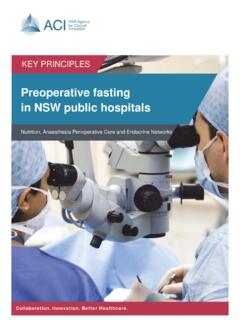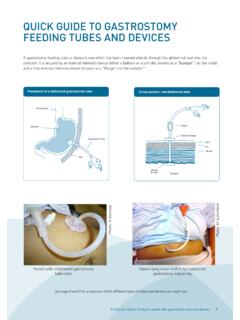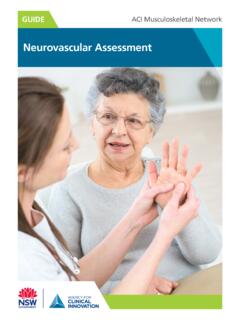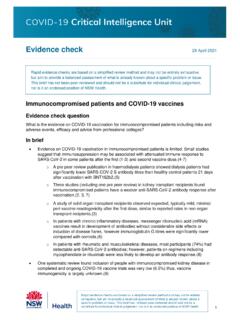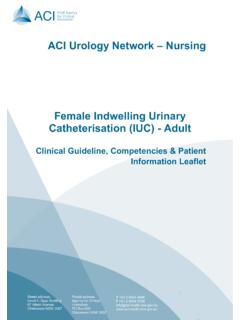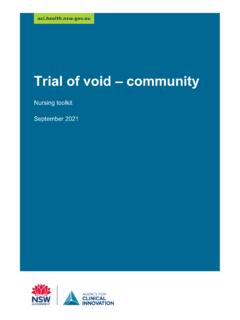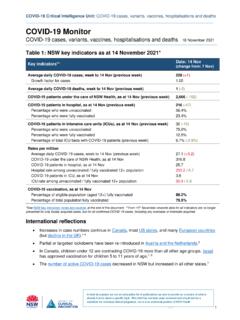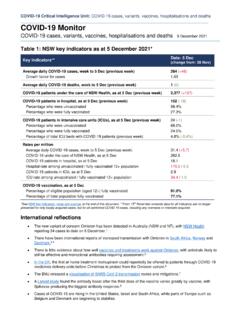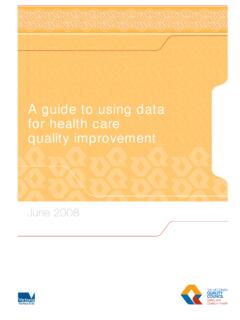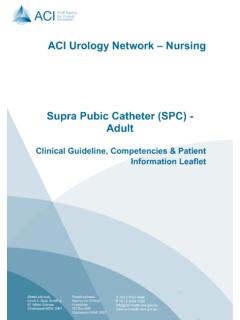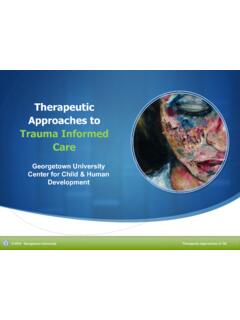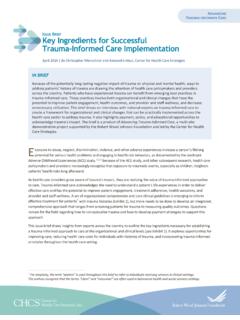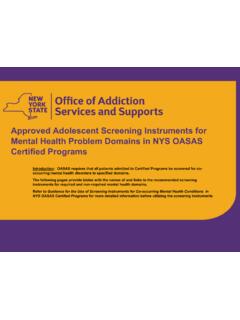Transcription of Trauma-informed care and mental health in NSW - evidence …
1 evidence SERIES. Trauma-informed care and mental health in NSW. NOVEMBER 2019. Contents At a glance 1 References 18. Summary 2 Appendices Appendix 1: Trauma-informed care 20. Introduction 4 in select jurisdictions Appendix 2: Empirically based studies on 22. Data and methods 6 the effectiveness of Trauma-informed care Research evidence : Acknowledgements 24. 8. Does Trauma-informed care work? Consumer survey multiple choice questions 10. Consumer survey free text comments 12. Clinician survey multiple choice questions 14. Clinician survey free text comments 16. mental health Network Agency for Clinical Innovation 67 Albert Avenue Chatswood NSW 2067.
2 PO Box 699 Chatswood NSW 2057. T +61 2 9464 4666 | F +61 2 9464 4728. E | Produced by: mental health Network Further copies of this publication can be obtained from the Agency for Clinical Innovation website at Disclaimer: Content within this publication was accurate at the time of publication. This work is copyright. It may be reproduced in whole or part for study or training purposes subject to the inclusion of an acknowledgment of the source. It may not be reproduced for commercial usage or sale. Reproduction for purposes other than those indicated above, requires written permission from the Agency for Clinical Innovation.
3 Preferred citation: NSW Agency for Clinical Innovation. Trauma-informed care in NSW. Sydney: ACI; 2019. SHPN (ACI) 190573. ISBN 978-1-76081-299-7. Version: V1; ACI_0316 [11/19] Date amended: November 2019. Trim: ACI/D19/3737. State of New South Wales (NSW Agency for Clinical Innovation) 2019. Creative Commons Attribution No derivatives licence. Trauma-informed care and mental health in NSW November 2019. Trauma-informed care in NSW. At a glance Trauma-informed care is an approach to service delivery based on an understanding of the ways trauma affects people's lives, their service needs and service usage.
4 It incorporates principles of safety, choice, collaboration, trust and empowerment. Safety Ensuring physical and emotional safety Collaboration Choice Sharing decision Individuals have making and power trauma - choice and control informed care Trustworthiness Empowerment Task clarity, consistency, Prioritising enablement interpersonal boundaries and skill building Research Consumer perspectives Clinician perspectives There is evidence that From an online survey: From an online survey: Trauma-informed care is Trust and therapeutic Acceptance of the relevance associated with.
5 Relationships are highly valued of trauma in healthcare Less seclusion and restraint Fewer than half of Almost one third respondents Better outcome respondents said: said care does not support they felt safe and people to recover from trauma Fewer staff injuries comfortable The barriers to trauma informed Less over-utilisation of they were involved in care span organisational, healthcare services decisions about their care professional, educational and and treatment structural factors Agency for Clinical Innovation 1 Trauma-informed care and mental health in NSW November 2019.
6 Summary Trauma-informed care is an approach to Traumatic experiences are more common within Aboriginal, ethnic minority and socially healthcare service delivery based on an disadvantaged groups understanding of the ways trauma affects people's lives, their service needs mental health services can cause iatrogenic harm to people who have experienced trauma and can and service usage. inflict vicarious trauma on staff Adopting a Trauma-informed care approach has the Trauma-informed care has widespread relevance potential to reduce the use of seclusion and restraint; that is broader than health extending into enhance therapeutic relationships and their basis in education, justice and other social trust, collaboration, respect and hope; and improve outcomes and value.
7 Trauma-informed care represents a This report summarises research evidence on the fundamental change but at the same time impact of Trauma-informed approaches on resonates with existing good practice processes and outcomes of care; and considers the extent to which mental health services in NSW are Many aspects of Trauma-informed practice overlap Trauma-informed , using empirical evidence drawn with general principles of good care such as person- from survey data and experiential evidence from centredness, recovery-oriented care and consumers and clinicians. compassionate care.
8 Adoption of Trauma-informed practice builds on the principles of good care, to emphasise the role that experiences of trauma play What do we mean by trauma ? in healthcare encounters and outcomes. trauma is defined as: an event, a series of events or a set of circumstances that is experienced by an Does Trauma-informed care work? individual as physically or emotionally harmful or life threatening and that has lasting adverse effects on Trauma-informed care has been associated with: the individual's functioning and mental , physical, decreased use of seclusion, restraint and other social, emotional, or spiritual well-being'.
9 1. coercive practices There is a substantial and growing body of evidence symptom resolution shorter length of stay, attesting to the pervasiveness and impact of improved rates of discharge to lower level of care, trauma . It shows the following: fewer presenting problems Experiences of trauma are associated with the better patient reported outcomes and coping skills development of mental distress and there is evidence of a dose effect and association fewer staff injuries between the severity, frequency and range of adverse experiences, and the impact on overall cost benefits.
10 mental , behavioural and physical health Many people accessing mental health services have experienced trauma Agency for Clinical Innovation 2 Trauma-informed care and mental health in NSW November 2019. Policy on Trauma-informed care In response to the statement, The care I received was sensitive to my individual needs, 24%. There is widespread policy support for trauma - disagreed and 22% strongly disagreed. informed care. For example, the Fifth National mental health and Suicide Prevention Plan states When asked whether they felt safe and that all staff should be trained in delivery of comfortable in the mental health environment that recovery-oriented and Trauma-informed care, and was involved in their care and treatment, asserts that founding mental health services on 21% said occasionally and 18% said never.
